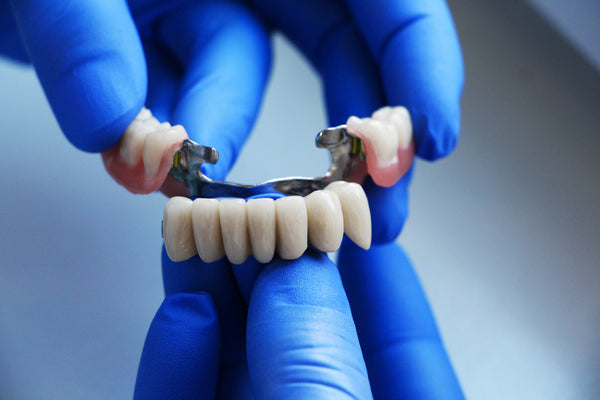
Renewed Smiles: Exploring Restorative Options for Missing Teeth
Let's be honest. A full set of healthy teeth is good for your smile and overall health. But the sad truth is very few people maintain all teeth during their lifetime, with gum disease, tooth decay, oral trauma, chronic illness, and lifestyle choices being the main culprit. According to a study, about 69% of adults between 35 and 44 lost at least one permanent tooth. By age 50, Americans lose an average of 12 teeth. The numbers are concerning. This is especially true since missing a tooth (or several):
- Impairs Chewing Function
- Affects Speech Clarity
- Causes Oral Discomfort:
- Impacts Digestive Health
- Contributes to Oral Health Problems
- Alters Facial Appearance
- Creates Functional Limitations
- Affects Self-Image and Mental Health
Luckily, several restorative options are available for individuals experiencing tooth loss. These options can help address the functional, aesthetic, and oral health consequences of missing teeth. This article will explore some of these restorative options.
Advancements in Restorative Dentistry Techniques and Technology

Restorative dentistry has made remarkable advancements in recent years. Today, patients have access to cutting-edge dental care techniques and technologies that can transform their smiles and enhance their overall quality of life. These innovations, from digital dentistry and 3D printing to minimally invasive procedures and regenerative therapies, allow dentists to perform procedures with greater precision, efficiency, and patient comfort.
For example, digital impressions and CAD/CAM technology enable the fabrication of custom-made restorations, like crowns and bridges that perfectly match your natural teeth. In root canal treatments, advances like digital imaging and guided endodontic procedures enable dentists to accurately diagnose and treat infected or damaged tooth roots with minimal discomfort and faster recovery times. The advancements in restorative and cosmetic dentistry have led to the development and use of biocompatible materials that offer natural-looking restorations that blend seamlessly with your existing teeth.
Types of dental restoration options for missing teeth
Here are some restorative options available to rejuvenate your smile and restore your confidence:
Dental Implants
Dental implants are the most advanced and long-lasting solution for replacing missing teeth. They involve surgically placing titanium posts into the jawbone, which serve as artificial tooth roots. Once the implants integrate with the bone, they can support different types of crowns, bridges, or dentures. Dental implants have high success rates and are considered the gold standard for tooth replacement because they look, feel, and function like natural teeth.
Pros
- Provide excellent stability and durability
- Look, feel, and function like natural teeth
- Preserve bone density and prevent bone loss
- Don't require alteration of adjacent teeth
- Long-lasting solution with proper care
Cons
- Dental implant surgery has a longer treatment timeline
- Higher initial cost compared to other options
- Requires adequate bone volume for implant placement
- Not suitable for everyone (e.g., smokers, individuals with certain medical conditions)
Dental Bridges

Dental bridges are prosthetic devices that replace one or more missing teeth by bridging the gap between natural teeth or dental implants. Traditional bridges consist of artificial teeth (pontics) fused between dental crowns, cemented onto adjacent natural teeth or implants. Bridges restore chewing function, maintain facial aesthetics, and prevent adjacent teeth from shifting.
Pros
- Restore chewing function and aesthetics
- Can be done in a shorter timeframe compared to implants
- Do not require surgery for placement
- Can be ideal for patients with insufficient bone for implants
Cons
- Requires the preparation of adjacent healthy teeth for support
- May increase the risk of decay or damage to supporting teeth
- Does not prevent bone loss in the jawbone
- May need replacement over time due to wear or failure
Dentures
Dentures are a set of personalized, wearable teeth tailored to fit comfortably in your mouth. They're used to replace missing teeth.
There are two types of dentures:
- Full Dentures: Used when all teeth in an arch are missing, full dentures consist of a flesh-colored acrylic base that supports a complete set of artificial teeth. They rely on suction and dental adhesives for retention.
- Partial Dentures: Used when some natural teeth remain, partial dentures consist of a metal or acrylic framework with artificial teeth attached. They are secured in place using clasps that grip onto neighboring natural teeth.
Pros
- Cost-effective solution for replacing multiple missing teeth
- Restores chewing function and facial aesthetics
- Removable option for easy cleaning and maintenance and overall oral hygiene
- Can be fabricated relatively quickly compared to implants or bridges
Cons
- May feel less stable and comfortable compared to implants
- Require periodic adjustments and replacements due to jawbone changes
- Can irritate the gums
- Increased risk of speech and eating difficulties compared to implants or bridges

Implant-Supported Dentures
Implant-supported dentures are removable ones anchored by dental implants instead of resting on the gums. They offer increased stability, comfort, and chewing efficiency compared to traditional removable dentures. Implant-supported dentures can be either fixed (permanent) or removable, depending on patient preferences.
Pros
- Combines the stability of implants with the affordability of dentures.
- Improved chewing efficiency and comfort compared to traditional dentures.
- Prevents bone loss and preserves facial structure like implants.
- Can be removable or fixed based on patient preference.
Cons
- Higher initial cost compared to traditional dentures.
- Requires sufficient bone volume for implant placement.
- Surgical procedure with a longer treatment timeline compared to conventional dentures.
- Potential for implant failure or complications requiring maintenance.
All-on-4/All-on-6
All-on-4 and All-on-6 are innovative implant-supported prosthetic solutions that replace an entire arch of teeth with just four or six strategically placed dental implants. These procedures offer a fixed, non-removable solution for complete tooth loss, providing patients with a natural-looking smile and improved chewing function.
Pros
- Provides a fixed, non-removable solution for complete tooth loss
- Requires fewer implants compared to traditional implant-supported dentures
- Immediate functionality with a temporary prosthesis on the same day of surgery
- Improved chewing function and aesthetics compared to traditional dentures
Cons
- Higher initial cost compared to traditional dentures or implant-supported dentures
- Requires adequate bone volume and quality for implant placement
- Surgical procedure with a longer recovery period compared to traditional dentures
Don't hesitate to call your dentist if you're considering restoring your smile or addressing any dental concerns. With the remarkable advancements in restorative dentistry techniques and technologies, there are now more options available than ever to enhance your oral health and quality of life.
For dental professionals seeking top-quality tools and products, Dental Finds has a huge selection of dental supplies and equipment to support their practice. From cutting-edge technologies to trusted essentials, Dental Finds has everything you need to deliver exceptional care to your patients.

